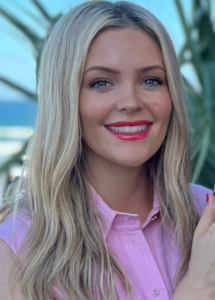Dr. Danielle H. Heinrichs is passionate about improving language education and would love to see the way we teach languages evolve in order to support multilingualism in Australian society.
As a heritage speaker of Spanish and German, Danielle’s family has lived some of the challenges of a monolingual society. Her grandfather came to Australia after WWII and spoke fluent English at the time. Partly due to the shame of being and speaking German post-WWII, discriminatory policies that favoured English in Australia, he never spoke German with his children, and the language tradition was not carried on.
 Danielle has a rich experience of the cultural and critical factors underpinning language use and acquisition. She completed a Masters in International Education (the only Masters specialising in this in Australia at the time). Her thesis looked at the Framework for Aboriginal and Torres Strait Islander Languages shortly after it was introduced as part of the Australian Curriculum and travelled to the Tiwi Islands as part of her research.
Danielle has a rich experience of the cultural and critical factors underpinning language use and acquisition. She completed a Masters in International Education (the only Masters specialising in this in Australia at the time). Her thesis looked at the Framework for Aboriginal and Torres Strait Islander Languages shortly after it was introduced as part of the Australian Curriculum and travelled to the Tiwi Islands as part of her research.
She then completed her doctoral studies in language education, sociolinguistics and Iberian studies by exploring how Spanish might be (re)imagined as a world language through the everyday practices of teachers. She is currently exploring the role of language and affect, language teacher (LOTE) educational pathways, and cross-cultural well-being of students.
What Danielle is curious about is what people actually study when they study a language. It is well known that LOTE teachers complete a degree to qualify them to teach in Australia, but what they study before or beyond this is less clear.
Danielle says,
“We know LOTE teachers study grammar and vocabulary, a little bit of culture, but it’s just the basics. There may be electives in additional cultural or film studies covering more of the critical content and theoretical perspectives on the culture and language they’re going to be teaching, but we don’t know. These courses, where teachers are exposed to a more critical, nuanced understanding of culture, they’re often in third year, are electives and may not be offered due to low enrolments. So on top of the fact that these units are unavailable or not mandatory, there is also the chance that teachers do not take a language until third year as many universities will award a language minor with only two years of study.”
Danielle is passionate about change in the way we teach languages. Whilst currently much of this is theoretical, she would love to see more resources and practical strategies for teachers to use in the classroom to help move away from problematic assumptions in language classrooms. These include views on authenticity, comprehensibility, and pronunciation, based on native-speakerism and monolingualism. We hear a lot about the monolingual mindset in Australia around English, but this mindset applies to other colonial languages.
“A lot of my pre-service LOTE teachers have done their studies in another country. So, it’s important to get this understanding around how well prepared they are to challenge these problematic functions embedded in language teaching, not necessarily in the curriculum, but even unintentionally reinforced by teachers themselves.”
Danielle says:
“Things like translanguaging would be a great start – this involves letting students draw on all their multilingual, semiotic and non-linguistic resources to understand what’s happening in the classroom. This also includes using technology, which has been shown to be beneficial to embrace in the language classroom”.
Danielle is a passionate researcher who is motivated by learning new theories. She is particularly interested in affect and disruptive or slightly controversial approaches in the field stemming from new materialism and critical race theory.
Danielle says:
“Another exciting approach which has come out of work on accent discrimination is Vijay Ramjattan’s work on anti-racist pronunciation pedagogy. This is super new, but when I see things like this, and I get excited. I would love to see how this kind of pedagogy in practice can be applied.”
Danielle believes that academics have a responsibility to rock the boat, or in her case, “set the boat on fire”. She is also inspired by social media, and the huge potential it holds in relation to language education research and challenging colonial language practices, especially TikTok.
Danielle says:
“Some people might not take it so seriously, but it’s really valid for what I’m trying to do”.
As a mother to a nearly 1-year old with a full-time position researching and teaching, Danielle has a lot on her plate. Her advice is to work in a field that you are passionate about and feels like you, and to remember that we all need to just “take a break” sometimes.
Read more of Danielle’s fascinating work and research here:



